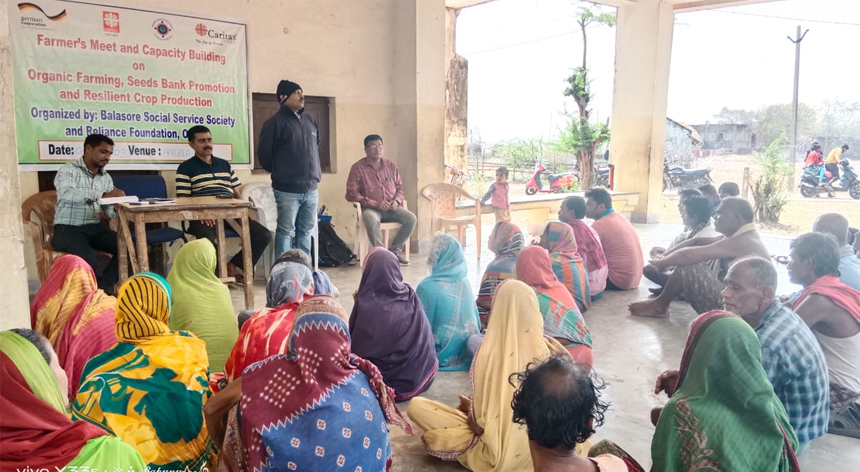Improving the lives of the particularly marginalized population through ensuring food security and building resilience to natural disasters is the key component of Global program India. Smallholder farmers living in the Odisha coast are vulnerable to socioeconomic and environmental challenges and have little power to seize any opportunity to overcome their situation.
The people of Andola and Balimeda, situated near the Mantei River in Bhadrak, are poorly affected by salinity and struggle to cope. The river’s saline water mixes with groundwater and reservoirs and affects agriculture.
The farmers started shifting to prawn cultivation due to heavy market demand, leaving agriculture to its fate. Exposure to disasters like floods, cyclones, lightning, fire, and other natural calamities adds to their misery by snatching their livelihood and further discouraging their interest in agriculture. Migration and unemployment are other challenges that have drastically increased.

Realizing the scope of livelihood opportunity, Global program partner Balasore Social Service Society (BSSS) collaborated with Reliance Foundation to organize farmers’ meet cum training to provide support on agriculture. These farmers have already received agricultural inputs like seeds and incentives from the Agriculture and Farmer Welfare Department.
Farmers learned the fundamentals of organic farming, resilient crop production, seed bank promotion, and pest control management. The benefits of organic farming were discussed as being economical, providing a good return on investment, high in demand, highly nutritional, and above all, environmentally friendly. Farmers were also exposed to the challenges of organic farming, such as limited production, incompetence in the market, and a shorter shelf life.

Mr. Dillip Kumar Pradhan, the regional coordinator of the Reliance Foundation, shared about the resilient crops that help farmers save their agricultural products during different types of disasters that occur every year in this area. He gave his input on improving the production of paddy and other crops, such as preparing land by stocking water before ploughing to decrease salinity. He shared that using gypsum powder and cultivating green gram in the rabi season increase the fertility of the land. He proposed to cultivate a small plant named Dhanicha 20 days before ploughing to increase the yield of paddy. For the saline belt area, resilient saline paddy named MTV-1064 (Amara), Luna- Subarna, CR-Dhan-405(Luna Sankhi), CR-Dhan-406 to be cultivated for better yield.
Mr. Brajendra Kumar Senapati, the Programme Associate of Caritas India, shared about seed bank management practices to preserve the seeds for future cropping, which can be used as a remedial solution after the disaster. He emphasized killing weeds before they set seed by threshing them from the fruits or flowers of flowering weeds; controlling creeping perennial weeds before they can form new rhizomes, tubers, or other propagules; walking fields to remove large weed escapes before they flower, mowing field margins to minimize seed set by weed species that have the potential to invade fields, etc.
A toll-free number of the Reliance Foundation, 1800-419-8800 was shared with the farmers to get immediate information assistance related to agriculture, animal husbandry, and climate change, along with information related to disasters and weather, government programs, or other related information. It was decided that BSSS would be the key between farmers, gram panchayats, and the department to get more information and subsidiary assistance from the department. Farmers were motivated to start zero-budget farming, vermin compost, and bio-degradable compost pits by utilizing government schemes like Mahatma Gandhi NREGA Scheme. A WhatsApp group was created by the resource person of the agriculture department to suggest or answer different questions from farmers on the use of fertilizer, pesticides, diseases that occur from time to time, and advice for quick remedial solutions by use of pesticides, hormones, etc. It was suggested to the Gram Panchayat to initiate rainwater harvesting proposals by using the Central Finance Commission/State Finance Commission Fund available with the respective departments.


Leave a Reply